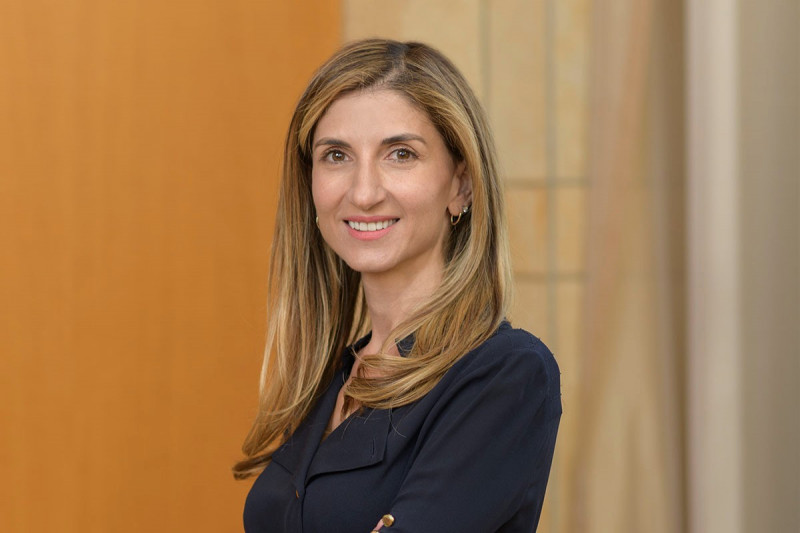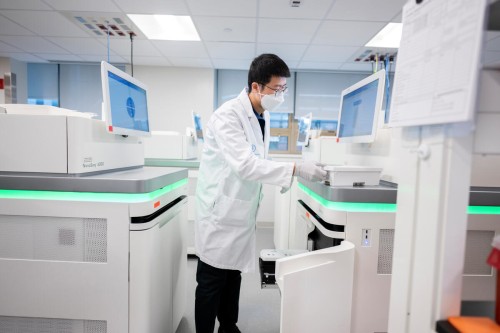
Coming to America
I was a refugee to the United States from Russia. I came here in 1991. I am Armenian by descent, and I learned English when I was 14. The International Rescue Committee sponsored my family to come to the United States, so we followed that opportunity.
People First
I was always interested in the human aspect of science. I was a cognitive psychology major in college while also being premed. I liked learning how people came to their personalities, conclusions, and behaviors. My first passion was always science, but I also had an interest in people. Medicine encompasses both. One reason I was attracted to cancer care is it’s an evolving, science-heavy field, but it has a strong people component. You need to explain things to people and form a strong bond with them because you’re often telling them things they don’t want to hear and are there with them during a hard time.
A Setback Leads to a Way Forward
I was always interested in challenging diseases and started off as a fellow at MSK studying lung cancer. I did a lot of research and was on the path to becoming a very successful scientist. But I was applying for jobs during the 2008 market crash, and the only position available at MSK was in GI oncology. I knew I could leave MSK, but I really didn’t want to. As a researcher, you learn how to form hypotheses and you find similarities between different cancers. I realized there were similarities in the molecular features that I was researching in lung cancer, specifically in the EGFR pathway, and stomach cancer. That’s how I built my research. What I perceived at the time as a crisis was an opportunity for growth and resilience.
Combining Forces
Abnormal HER2 receptors drive the growth and spread of some breast cancers and also several GI cancers, including esophageal cancer, stomach cancer, and colon cancer. I was able to demonstrate for the first time that combining the HER2-directed agent trastuzumab (Herceptin®) with immunotherapy — in this case, pembrolizumab (Keytruda®) — improved the response rate in people with esophageal cancer and stomach cancer. Historically, immunotherapy has not been used for HER2 cancers. The typical response in a phase III trastuzumab and chemotherapy trial is 47%. In our study, we had an 87% confirmed partial reduction. That means the tumors shrank 30% or more. What’s more, everyone had a reduction of their cancer. The findings were presented at the American Society of Clinical Oncology’s 2019 Gastrointestinal Cancers Symposium and published in the Journal of Clinical Oncology. These responses were promising and unprecedented. They led to a phase III study that has the potential to change the standard of practice. Hopefully, the combination of trastuzumab and pembrolizumab will become available for people around the world with HER2-positive esophageal and stomach cancer.
To Be Precise
I am very involved in the precision prevention work that Luis Diaz is doing. I am studying circulating tumor DNA, which is free-floating DNA that cancer cells shed into the bloodstream, to detect and treat people with minimal residual disease (MNR). MNR is a microscopic level of disease we cannot see but know is there. If we ignore it, it can cause cancer progression or recurrence. We think circulating tumor DNA is the best method right now for predicting who is at the highest risk for cancer coming back. So we try to find those people and treat them with immunotherapy.
Patience Pays Off
I tell my patients that slow and steady wins the race. The field is evolving at such a rapid pace that we can continue treatment and keep them well for longer until new therapies come up. Month to month, year to year, the field changes so much.
Donations to Discovery
I have been involved in Cycle for Survival for six years. Every dollar raised at Cycle for Survival’s annual indoor-cycling events goes to rare cancer research led by MSK within six months of the close of fundraising. Cycle for Survival has been really instrumental in funding a lot of ideas looking at mutations in esophageal and stomach cancer. Thanks to Cycle, we were able to use MSK-IMPACT™, which looks for gene mutations that contribute to a person’s cancer, to sequence 500 people with esophageal cancer. If MSK-IMPACT revealed that they had a mutation, we could treat them with medicines that go directly after that mutation. Based on our data, now anyone with esophageal or stomach cancer can have their disease sequenced, and insurance can pay for it. That was a big win.
What Gets Me out of Bed
What I love about working here is the support and expertise of my colleagues — pathology, radiology, surgery, nursing, and more. But also, whatever I do, it helps more than just the people around me. I was recently at a conference and someone from Japan said they’re following the research I’m doing and changing their practice based on my work. That kind of impact is tremendous. You can be doing a lot of research, but if you’re at a place where your ideas aren’t translated into practice quickly, you won’t be able to make as big of an impact. Everybody at MSK is just exceptionally committed to helping our patients do better and setting the bar high for the rest of the world.






